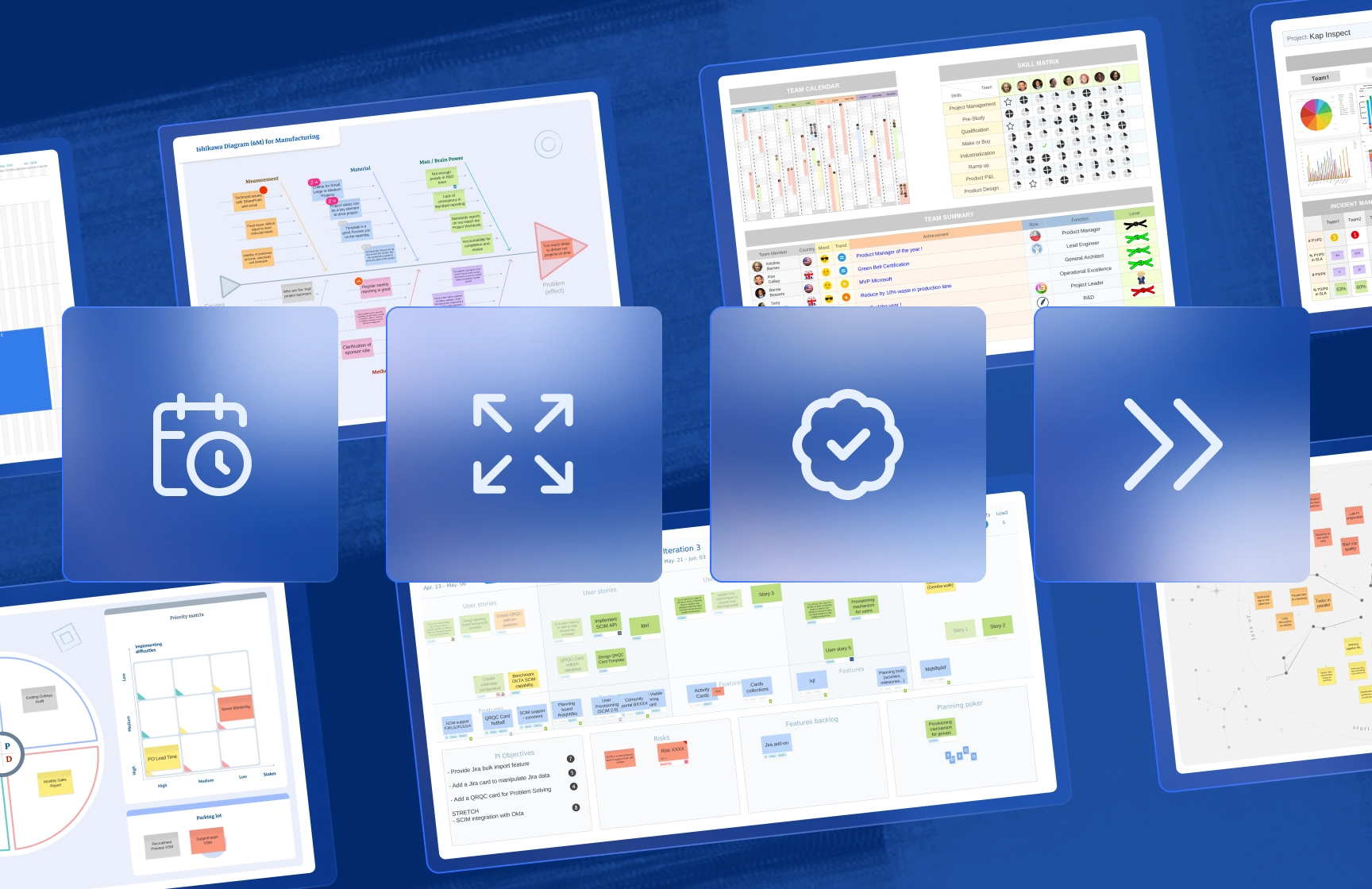Hey, let’s start your
iObeya journey!
Lean Management has had a profound impact on large enterprises since the 1990s and continues to be a source of business efficiency, productivity, and adaptability in today’s economic landscape. At its core, the Lean Management business approach focuses on maximizing value for customers. It is a set of principles, practices and tools aimed at optimizing efficiency, minimizing waste, and ensuring high-quality products by combining human intelligence with automation and smart technology.
Where Did Lean Management Come From?
Lean Management originated from the Toyota Production System (TPS) and has since been widely adopted across a wide variety of industries and sectors. It is grounded on 2 pillars, Just-in-Time (JIT) production and Jidoka, and supported by a foundation of Kaizen and Respect for People. Common Lean Management techniques include Kanban systems , 5S workplace organization, Total Productive Maintenance (TPM), and continuous problem-solving methodologies.
5 Key Benefits of Embarking on a Lean Management Transformation
Overall, Lean Management principles and practices help organizations improve efficiency, quality, and customer satisfaction while reducing resource expenditure and lead times. The benefits of implementing Lean Management are vast, broadly ranging from improving processes, reducing waste, and creating a culture of continuous improvement. Here are just 5 of the key benefits of Lean Management.
Customer Focus and Satisfaction
Lean Management is centered around delivering maximum value to the customer, so it is no surprise that this is first among the list of benefits. By understanding customer needs, aligning processes to directly meet these needs and generating a feedback loop to continuously improve based on customer feedback, organizations greatly improve customer satisfaction. This, in turn, creates brand advocates and increases brand reputation, contributing to more growth. These enhanced processes and feedback loops also ensure organizations can quickly adapt to shifting market and customer needs while optimizing resource allocation. When a product can evolve to continuously meet ever changing customer needs it ensures an organization’s longevity.
Increased Efficiency and Productivity
Lean Management aims to eliminate waste and streamline processes. Organizations can achieve higher efficiency and productivity by optimizing workflows, curtailing non-value-added activities, and maximizing resource allocation. Eliminating the 8 wastes of Lean (TIMWOODS) also, in turn, reduces costs and increases efficiency. Additionally, error-proofing techniques and standardized work processes help the work flow smoothly throughout the value stream.
Improved Lead Time
With less waste in the system, the lead time greatly decreases allowing organizations to iterate much more rapidly. Leveraging Lean Management principles and practices such as Kanban and Value Stream Mapping, teams can quickly identify and manage project bottlenecks to continuously improve processes. Teams are also equipped tools for effective problem solving; quickly detecting problems, sharing solutions, and turning solutions into actions.
Employee Engagement and Empowerment
Lean management encourages both continuous improvement and respect for people. Enterprises which foster a culture of problem-solving, continuous learning, and autonomy and empowerment have higher employee engagement and satisfaction. Leveraging Lean management to align organizational layers and breaking down silos encourages innovation and motivation to contribute to larger strategic initiatives across the enterprise. Overall, Lean management enables teams to have the right information at the right time to make the right decision to deliver the right value.
Sustainable Competitive Advantage
Once Lean management principles and practices are successfully implemented, it provides a foundation for continuous improvement and operational excellence. By continuously identifying and eliminating waste, incrementally enhancing efficiency, and adapting to deliver maximal value to customers, organizations with Lean Management embedded into their culture position themselves to become and remain leaders in their industry.
It is clear that Lean Management not only enhances the effectiveness of organizational processes but also creates a customer-centric, employee-empowered culture that is critical for long-term success.
For organizations starting or already on a Lean transformation journey with a strong commitment to fostering a Lean culture throughout the organization, embracing Lean Management principles will undoubtedly help you unleash your full potential.
For organizations starting or already on a Lean transformation journey with a strong commitment to fostering a Lean culture throughout the organization, embracing Lean Management principles will undoubtedly help you unleash your full potential.
Lean







